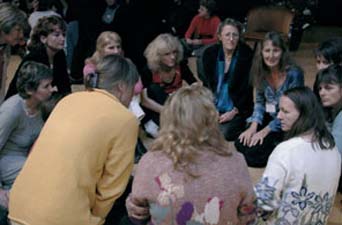4.3 Green from the grassroots up
People who demand a radical break with the business-dominated path of economic globalisation believe that the claims of the mainstream business community are at best hopelessly inadequate, and at worst deceitful. However, they know they have to come up with some answers of their own. This section outlines ideas that seek to underpin a transition to green economies owned and run at grassroots level. Sounds ambitious? Box 3 describes Findhorn, a groundbreaking community that started out on a windswept caravan park in Scotland.
You can get a fuller picture of how these components contribute to their definition of sustainability by drawing on the plentiful web resources produced by what used to be called communes, but are now sometimes referred to as ‘intentional communities’.
Of course, Findhorn is a very special place, although there are others like it, and it is not easy to imagine urban Britain turning to this way of life in a big way. But it illustrates a movement of experimentation at local level that is generating some ideas that could be scaled up to help make whole societies more sustainable.
Box 3 The Findhorn eco-village – a sustainable future?
In the early 1960s an unemployed couple tried to start growing vegetables on a very unpromising sandy plot on a caravan site on the east coast of Scotland. A powerful founding myth of today's Findhorn community is that their garden grew prodigiously and attracted stunned horticulturalists to the scene. In time, a community grew there too, now numbering 400 people, with a further 4000 people visiting annually for retreats and courses (Figure 14).

Findhorn has become one of the best known of a global network of eco-villages. An eco-village is a small community of between 50 and 2000 people, based on shared ecological, social and/or spiritual values. Working on the principle of not taking more from the Earth than you give back, eco-villages aim to be sustainable – indefinitely. The eco-village is a response to the complex problem of how to turn human settlements, be they villages, towns or cities, into sustainable communities, and to integrate them into the natural environment. The Eco-village Project at the Findhorn Foundation aims to be a synthesis of the best current thinking on human habitats. Quality of life, cooperation and co-creation with nature are some of the driving principles. They suggest that eco-village principles can be applied to both rural and urban settings, to developed and less-developed countries. These principles are put into action through a commitment to some or all of:
ecological building
renewable energy systems
local organic food production
sustainable economics based around local businesses
social and family support within the community.
(Source: Findhorn Foundation, 2002)
